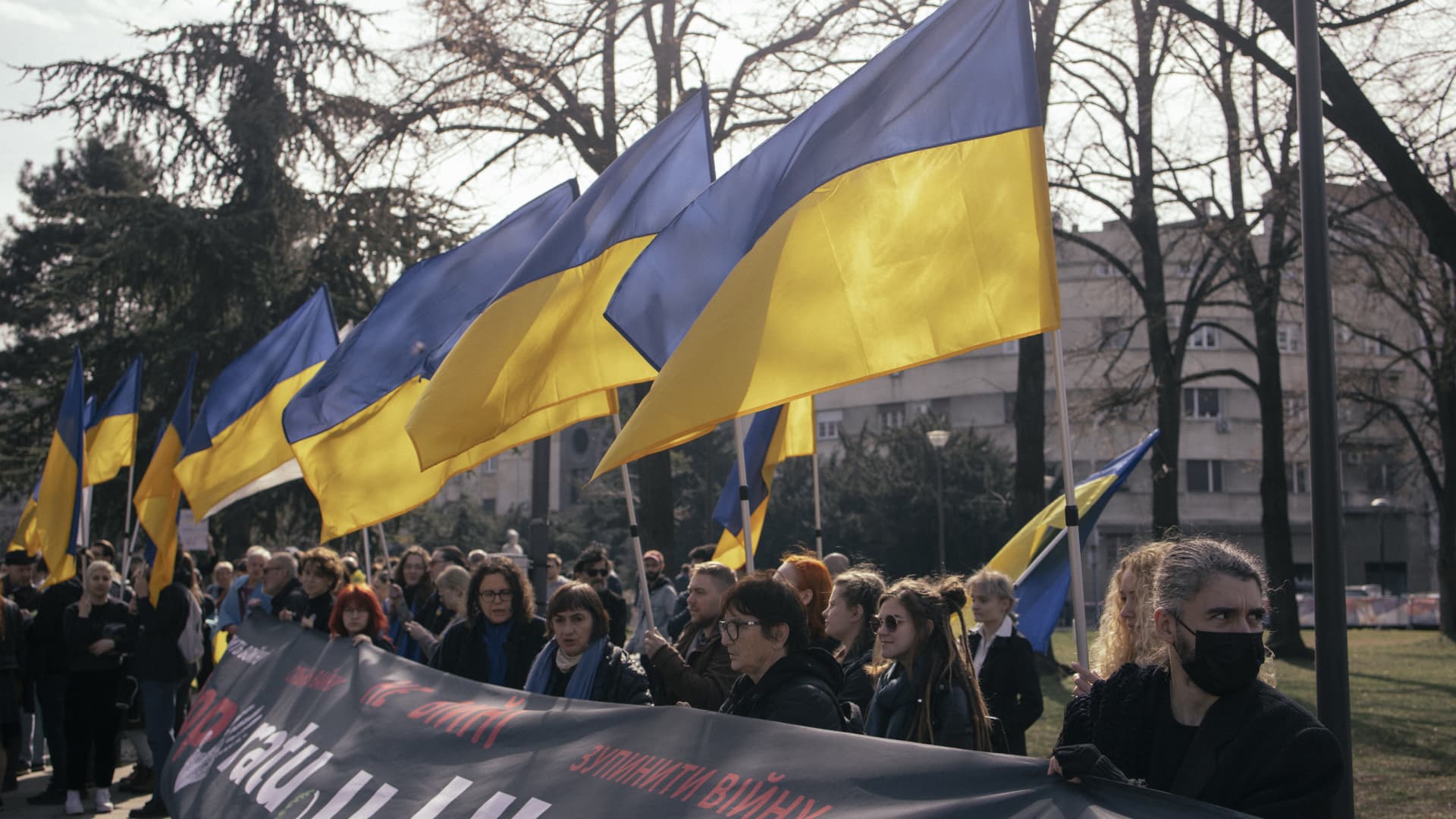People hold up a banner and Ukrainian flags during a rally marking the one-year anniversary of Russia’s invasion of Ukraine on February 24, 2023 in Belgrade, Serbia. As part of the Western Balkan bloc awaiting EU membership, Serbia finds itself caught in a geostrategic rivalry between its Western allies and Russia.
Vladimir Zivojinovic | Getty Images News | Getty Images
DAVOS, SWITZERLAND – Russia’s invasion of Ukraine gave new political momentum to the European Union and its expansion plans in the strategically important Western Balkans. However, it remains unclear whether the neighboring region is ready and willing to finally take the necessary steps to join the union.
The Western Balkans, consisting of Albania, Bosnia and Herzegovina, North Macedonia, Montenegro, Kosovo and Serbia, represent a notable gap on the map of EU membership in southeastern Europe.
Although both countries have applied for and received candidate or potential candidate status over the past two decades following the fall of the Socialist Federation of Yugoslavia in 1992, progress toward accession has generally been slow.
“I see the European Union more ready for the Balkans than the Balkans for the European Union,” Miroslav Lajčák, EU special representative for the Belgrade-Pristina dialogue and the Western Balkans, told CNBC last month.
Accession to the Union is a rigorous and often lengthy process that involves several phases of negotiations and reforms to ensure that a candidate state meets the EU’s legal, administrative and economic standards.
Lajčák said that in the past, Western Balkan countries had been hesitant to really commit to such reforms because they “did not believe in a real European future” – or because they could realistically meet the requirements.
But that changed with the outbreak of war on Europe’s doorstep in February 2022.
Ukraine, Moldova and Georgia brought new energy and commitment – something that was almost lost in the Balkans.
Miroslav Lajčák
EU Special Representative for the Belgrade-Pristina Dialogue and the Western Balkans
Just days after the Russian invasion, Ukraine, neighboring Moldova and shortly thereafter neighboring Georgia applied for EU candidate status. At the end of 2023, the EU began accession talks with Ukraine and Moldova and granted candidate status to Georgia, giving momentum to the European project and signaling new hope for other accession candidates.
“Ukraine, Moldova and Georgia brought new energy and commitment – something that was almost lost in the Balkans,” said Lajčák. “Now it is very clear that the European Union is serious.”
Although Ukraine, Moldova and Georgia lie outside the Western Balkans and are part of Europe’s former Eastern Bloc, Lajčák said progress should move the region forward in accession talks. Negotiations are currently underway in all countries except Kosovo, a potential candidate country. However, Lajčák pointed out that this openness may not last indefinitely.
“The train is here and will leave the station. If they don’t get on board, they will miss a great historic opportunity,” he said.
An atmosphere of EU enlargement
The EU’s accelerated enlargement comes as the bloc seeks to strengthen its assertiveness in the face of Russia’s war in Ukraine and the disintegration of the US-led global order. Lajčák said this had led to the atmosphere in Brussels becoming “more political” than in the past.
“It used to be said that enlargement meant expanding the scope of European values and rules. Now it is seen more geopolitically,” said Lajčák.
“It makes us stronger, it makes us bigger, it makes our market bigger. So it’s less idealistic and more pragmatic.”
It would be economically insane [for European countries] look elsewhere.
Miroslav Lajčák
EU Special Representative for the Belgrade-Pristina Dialogue and the Western Balkans
The increased political emphasis has made the direction of foreign policy for the accession process more important than ever, as EU unity was already compromised by the intransigence of existing member Hungary. This could prove to be a sticking point for certain potential members.
For example, Serbia – the largest country in the region – loudly condemned Russia’s invasion of Ukraine but refused to impose sanctions on the country. Indeed, Belgrade has often clashed with Western allies on foreign policy issues and continues to maintain close ties with Russia and China.
Meanwhile, both Moscow and Beijing have sought to increase their economic and political influence in the Western Balkans, potentially destabilizing the entire region.
Nevertheless, Lajčák insisted that neither country could compete with Brussels in terms of its investment and trade offering. “The credible enlargement process is the best answer to third-party interference,” said Lajčák. “That would be economically crazy [for European countries] look elsewhere.”
Source link
2024-02-05 08:10:39
www.cnbc.com







